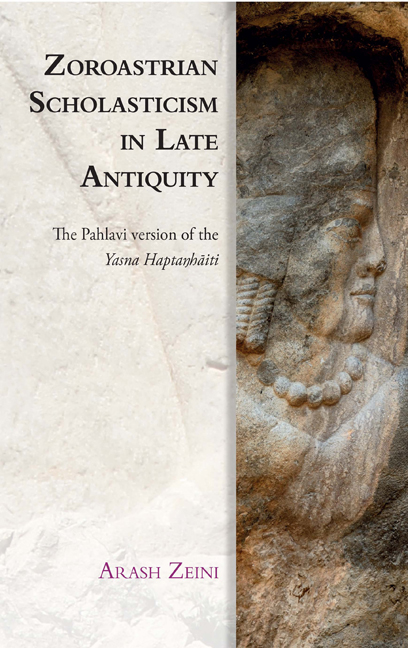Book contents
- Frontmatter
- Contents
- List of Figures
- List of Tables
- Acknowledgements
- Series Editor’s Preface
- Preface
- Conventions
- Abbreviations
- Dedication
- Part I Introduction
- 1 Introduction
- 2 The Zand
- 3 Scholasticism
- 4 Fire in Zoroastrianism
- 5 Precis: Yasn Ī Haft Hād
- Part II Text and translation
- 6 PY 35
- 7 PY 36
- 8 PY 37
- 9 PY 38
- 10 PY 39
- 11 PY 40
- 12 PY 41
- Part III Miscellaneous Observations
- 13 PY
- 14 PY 36
- 15 PY 37
- 16 PY 38
- 17 PY 39
- 18 PY 40
- 19 PY 41
- Part IV Epilogue
- 20 Reflections on the Zand
- Appendices
- Appendix A Transliteration and Apparatus
- Appendix B Y 9.1
- Appendix C Fire in the Older Avesta
- Appendix D Iϑā
- Appendix E MSS Concordance
- Bibliography
- Index of Passages Quoted
Appendix B - Y 9.1
Published online by Cambridge University Press: 14 October 2020
- Frontmatter
- Contents
- List of Figures
- List of Tables
- Acknowledgements
- Series Editor’s Preface
- Preface
- Conventions
- Abbreviations
- Dedication
- Part I Introduction
- 1 Introduction
- 2 The Zand
- 3 Scholasticism
- 4 Fire in Zoroastrianism
- 5 Precis: Yasn Ī Haft Hād
- Part II Text and translation
- 6 PY 35
- 7 PY 36
- 8 PY 37
- 9 PY 38
- 10 PY 39
- 11 PY 40
- 12 PY 41
- Part III Miscellaneous Observations
- 13 PY
- 14 PY 36
- 15 PY 37
- 16 PY 38
- 17 PY 39
- 18 PY 40
- 19 PY 41
- Part IV Epilogue
- 20 Reflections on the Zand
- Appendices
- Appendix A Transliteration and Apparatus
- Appendix B Y 9.1
- Appendix C Fire in the Older Avesta
- Appendix D Iϑā
- Appendix E MSS Concordance
- Bibliography
- Index of Passages Quoted
Summary
MIΘRŌ ZIIĀT̰ZARAΘUŠTRƎM
The above clause is only attested in some of the Avesta manuscripts as part of (P)Y 3.3c. As I point out in Section 3.3, I do not consider miϑrō ziiāt̰ zaraϑuštrəm a fragment from a lost Av. text, but a newly composed Avestan sentence.
Spiegel (1861: 52) includes ‘mithrô zayâṭ zarathustrem’ in his Sanskrit text, but is unable to translate it. Agreeing with Burnouf, Spiegel considers the possibility of this fragment being a quotation from an unknown Av. text, perhaps its beginning words. Observing that the clause does not occur in the Pahlavi section, Spiegel goes on to suggest that it corresponds to ‘miϑrō upāit zardušt’. Bartholomae (1904: 1659) prefers zayāt̰ as well, suggesting it could be a preterite derived from zan ‘ to know’. To support this translation, he adduces a phrase from the Zand, paydāg kū-š šnāxt, proposing that it translates zayāt̰. Like Spiegel, Bartholomae seems to equate Av. miϑrō ziiāt̰ zaraϑuštrəm with miϑrō upāit zardušt, as it is the latter which is followed in the Zand by paydāg kū-š šnāxt. Based on Geldner's (1886–96: 39) apparatus, Kellens (2007: 46) translates miϑrō.ziiāt̰zaraϑuštrəm as ‘Zaraθuštra loin de celui qui frustre Miθra’. Discussing Kellens's translation, Skjærvø (2009c: 706) too assumes a correspondence between the two clauses, stating that ‘In the oldest manuscripts, however, the fragment is written in Pahlavi [miϑrō upāit zardušt ] and is part of the Pahlavi commentary, while the Avestan version [miϑrō ziiāt̰zaraϑuštrəm ] is found in later manuscripts.
No doubt, miϑrō upāit zardušt is part of the Zand of Y 9.1c and is attested in all manuscripts. As Skjærvø (2009c: 706) correctly observes, in almost all manuscripts it is written as 〈mtlwk hwp ʾYTˈ zltwštˈ〉. A transcription as mihr xūb ast zardušt is tempting. The common spelling for mihr, however, is 〈mtrˈ〉, and the actual and contextual meaning of mihr xūb ast zardušt is unclear. An Avesticised form such as mihrō in line with Pahlavi spelling conventions is unlikely.
- Type
- Chapter
- Information
- Zoroastrian Scholasticism in Late AntiquityThe Pahlavi Version of the Yasna Haptaŋhāiti, pp. 364 - 367Publisher: Edinburgh University PressPrint publication year: 2020



